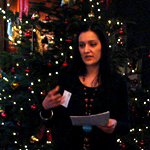Euroacademia Conferences
 Europe Inside-Out: Europe and Europeanness Exposed to Plural Observers (9th Edition) April 24 - 25, 2020
Europe Inside-Out: Europe and Europeanness Exposed to Plural Observers (9th Edition) April 24 - 25, 2020 Identities and Identifications: Politicized Uses of Collective Identities (9th Edition) June 12 - 13, 2020
Identities and Identifications: Politicized Uses of Collective Identities (9th Edition) June 12 - 13, 2020 8th Forum of Critical Studies: Asking Big Questions Again January 24 - 25, 2020
8th Forum of Critical Studies: Asking Big Questions Again January 24 - 25, 2020 Re-Inventing Eastern Europe (7th Edition) December 13 - 14, 2019
Re-Inventing Eastern Europe (7th Edition) December 13 - 14, 2019 The European Union and the Politicization of Europe (8th Edition) October 25 - 26, 2019
The European Union and the Politicization of Europe (8th Edition) October 25 - 26, 2019 Identities and Identifications: Politicized Uses of Collective Identities (8th Edition) June 28 - 29, 2019
Identities and Identifications: Politicized Uses of Collective Identities (8th Edition) June 28 - 29, 2019 The European Union and the Politicization of Europe (7th Edition) January 25 - 26, 2019
The European Union and the Politicization of Europe (7th Edition) January 25 - 26, 2019 7th Forum of Critical Studies: Asking Big Questions Again November 23 - 24, 2018
7th Forum of Critical Studies: Asking Big Questions Again November 23 - 24, 2018 Europe Inside-Out: Europe and Europeanness Exposed to Plural Observers (8th Edition) September 28 - 30, 2018
Europe Inside-Out: Europe and Europeanness Exposed to Plural Observers (8th Edition) September 28 - 30, 2018 Identities and Identifications: Politicized Uses of Collective Identities (7th Edition) June 14 - 15, 2018
Identities and Identifications: Politicized Uses of Collective Identities (7th Edition) June 14 - 15, 2018
Culture and Identity as Tools for Forging Europeanization
-
-

-
Presentation speakers
- Martina Topic , Faculty of Political Science, University of Zagreb, Croatia
- Download presentation
Abstract:
Cultural diplomacy is understood as an exchange of ideas, information, values, traditions and beliefs and this can include fields such as art, sport, literature, music, science and economy. Public, civil and private sector promote cultural diplomacy, with public sector promoting domestic values and culture, often with the influence from politics; civil society promotes national interests usually in the fields of academic exchange, protection of rights and tourism and private sector exchanges information on a personal basis. Tourism is however generally seen through the cultural clash between the hosts and the visitors and these clashes then create new identities.
Croatia is best known for sports and tourism and presents and interesting case of European oriented politics. Croatian national tourist offer largely falls within the scope of the ‘cultural tourism’ however, whereas normally the civil society promotes the tourism, in Croatia’s case it’s the state sector.
For example, the tourist offer for the coastal counties is largely relying on, what is perceived to be, the culture. Therefore, the county of Zadar has a slogan ‘Where Croatian culture starts’, county of Šibenik is framed as a cultural Millennium town firstly mentioned in 1066, county of Split through the roman emperor Diocletian and his palace built in Split in year 305, old Salona as an architectural treasure, county of Dubrovnik through the protection of UNESCO, etc.
The culture is however presented through the la longue durée policy proving the historical legacy of Croatian statehood and unquestionable Europeanism of Croatia.
Drawing from the findings from FP7 IME project, this paper explores discourses surrounding the culture, the identity and the European in Croatian national tourist offer in an attempt to answer in what way the culture and the identity are understood in Croatia and in the rest of Europe.
Note:
As a part of the dissemination activities for the FP7 IME project, international collective volume on the issue of cultural diplomacy and identity in Europe is currently being prepared (contracted for publishing in 2012) and this conference would also serve as a platform for discussing the issues on cultural diplomacy in Europe that could be included in the volume. -
Related Presentations

Collaboration, Cultural Diplomacy and Conflicting Representations in Contemporary Art Biennials
- Federica Martini Schellenberg

Differentiated Integration as a Trend of EU Future Development
- Nikolay Kaveshnikov

Distant and Apolitical? A Comparative Study of the Domesticisation and Politicisation of the EU in Yorkshire (UK) and Galicia (Spain)
- Francisco Seoane Perez
- Juliet Lodge














